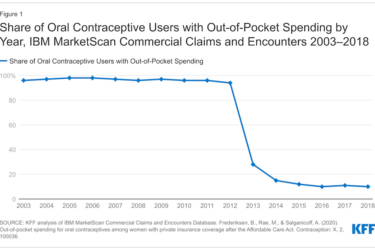One of the big stories reported on Aug. 21 involved the Kaiser Family Foundation/Health Research & Educational Trust (HRET) 2013 Employer Health Benefits Survey. The survey results were reported widely, including the fact that annual premiums for employer-sponsored family health coverage reached $16,351 this year, up 4 percent from 2012.
The Kaiser/HRET survey of more than 2,000 small and large employers provides a thorough review of employers’ health insurance strategies for this year and trends since 1999.
During the conference call to announce the results, Kaiser President and CEO Drew Altman, Ph.D., pointed out that even though the 4 percent increase was relatively moderate compared with the increases reported in past years, the perception among a majority of Americans is that premiums are rising faster than usual, as Sarah Kliff reported.
Altman explained that part of the reason for this perception is the continued rise in high deductibles and the growth in high-deductible health plans (HDHPs), which cause insured Americans to pay more out of pocket. “They don’t just pay their share of the premium, they pay other forms of cost sharing, especially their deductibles.”
The trend to enroll employees in HDHPs is especially strong in smaller companies and is part of a number of stories health journalists are pursuing, Altman commented. The survey showed that in 2006, only 4 percent of employees in employer-sponsored plans were in HDHPs, but this year, 20 percent of employees are in these plans.
“It’s part of the cost sharing story which we all think plays a role in the slowdown of health care costs that we’re seeing,” Altman added. “It’s also part of a quiet revolution in health insurance as we move away from more comprehensive to less comprehensive health insurance with higher deductibles. Because we’ve all been focused on Obamacare, this trend hasn’t gotten a lot of attention.
“It has a political dimension because conservatives are very upset about Obamacare but beneath the radar screen the vision of insurance that they’ve always favored — because the insured have more skin in the game — is coming to dominate in the marketplace,” he Altman continued. “Actually it’s getting a boost from Obamacare ironically because many of the health plans in the exchanges have high deductibles.”
One other trend stood out in the report: 35 percent of responding employers said wellness programs were very effective at controlling costs. Among all strategies, wellness programs were rated the most effective at cost control, the survey showed, even though some experts have raised questions about the effectiveness of wellness programs.
While the Kaiser/HRET survey is extremely thorough, there are other ways to view the effect of rising health care costs on American families. One is the 2013 Milliman Medical Index (MMI). Of the MMI, Milliman says: “Last year, when healthcare costs for the typical American family of four exceeded $20,000 for the first time, the Milliman Medical Index compared the cost of a family’s health care to the cost of an average midsize sedan. This year, with costs exceeding $22,000 ($22,030), we note that other major purchases are also comparable to the annual cost of health care. For example, the cost of attending an in-state public college is $22,261 for the current academic year.”
One more survey is due out this week. The National Business Group on Health will have a press briefing on Aug. 28 at 10 a.m. at the National Press Club to discuss its survey, “Large Employers’ 2014 Health Plan Design Changes.” This survey of large employers on health benefit costs is conducted mid-year as employers are completing their plans for the next year. Like the Kaiser/HRET survey, the NBGH analysis will focus on trends in benefit costs, cost sharing, consumer directed plans, and wellness programs. Also, the survey addresses employers’ views on the role of health insurance exchanges in providing employees access to coverage.
For more information about the briefing, including remote access, call Ed Emerman at 609-275-5162 or send him a note at eemerman@eaglepr.com.









